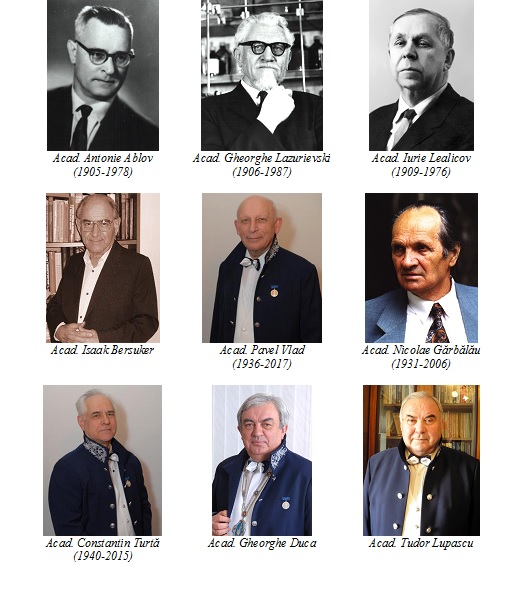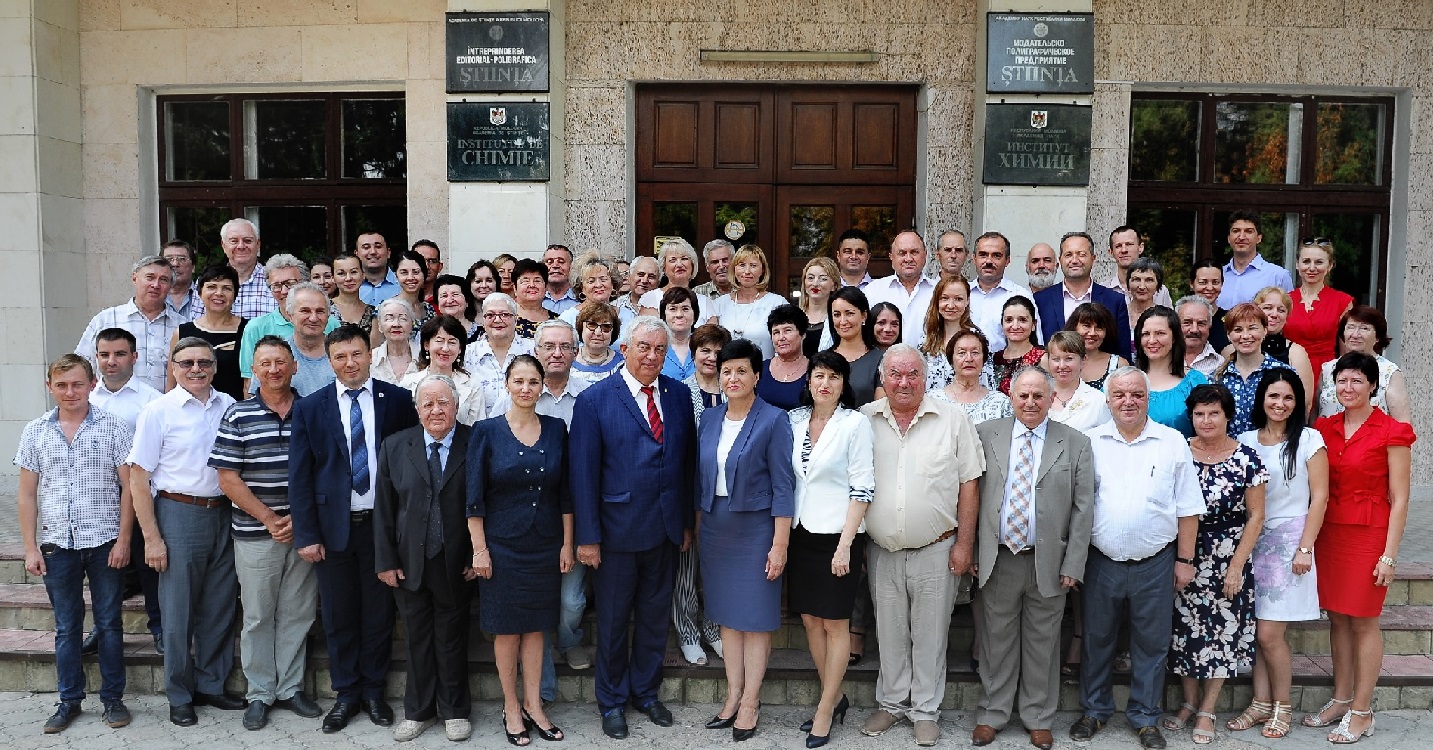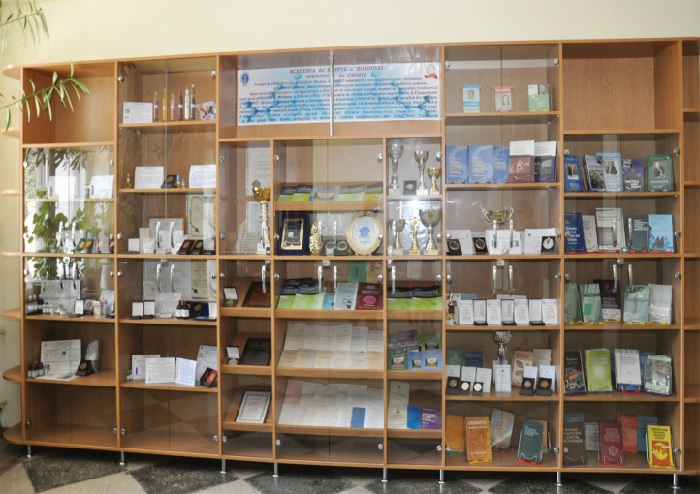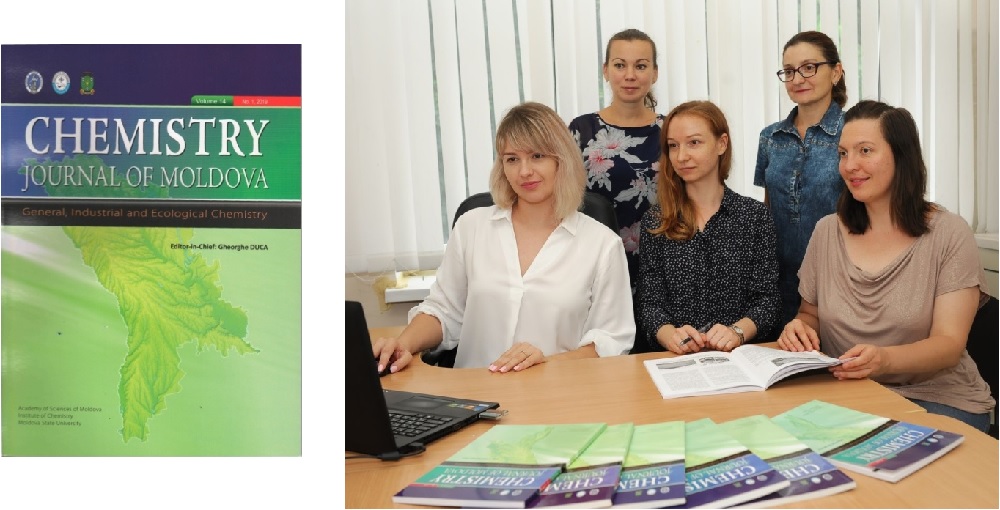Devoted to the celebration of the World Science Day
„Science – the convergence between past, present and future”,
November 10, 2021
The Institute of Chemistry was established in 1959 on the basis of the Department of Organic Chemistry, and that of Inorganic Chemistry and the Laboratory of Analytical Chemistry of the Moldovan Branch of the Academy of Sciences of the USSR.
The cornerstones of scientific directions of the institute were laid down by famous researchers, members of the Academy of Sciences, founders of scientific schools in the Republic of Moldova: acad. Antonie Ablov (1905-1978) – school of coordination compounds chemistry; acad. Gheorghe Lazurievski (1906-1987) – school of organic and bioorganic chemistry, acad. Iurie Lealicov (1909-1976), organizer and leader of research related to physical-chemical methods of analysis – school of polarography.
Later, new scientific schools were created, those of quantum chemistry – headed by acad. Isaak Bersuker; organic, bioorganic chemistry and chemistry of natural and physiologically active compounds – headed by acad. Pavel Vlad (1936-2017); chemistry of coordination, macrocyclic and supramolecular compounds – headed by acad. Nicolae Garbalau (1931-2006); bioinorganic chemistry – headed by acad. Constantin Turta (1940- 2015); ecological chemistry – headed by acad. Gheorghe Duca and the scientific school in the field of chemistry of adsorbents was created by acad. Tudor Lupascu.

During the 60 years of scientific activity, Institute of Chemistry was directed by: acad. Antonie Ablov (1959-1961 and 1965-1975); acad. Gheorghe Lazurievski (1961-1965); acad. Pavel Vlad (1975-1995); acad. Nicolae Garbalau (1995-2001); acad. Tudor Lupascu (2001-2018) and dr. habilitate Aculina Aricu (from 2019).
During the years, the Institute of Chemistry passed through several structural and research-related reforms. Now the institute includes three scientific centres:
- Centre of Physical and Inorganic Chemistry, head of the centre academician Gheorghe DUCA;
- Centre of Ecological Chemistry and Environmental Protection, head of the centre academician Tudor LUPAȘCU;
- Centre of Applied Organic Chemistry, head of the centre dr. habilitate Aculina ARICU.
At present, the scientific potential of the Institute of Chemistry is represented by 100 scientific researchers, including three full members of the ASM, one corresponding member, 11 doctors habilitate and 46 doctors of sciences.

Results and achievements
The results of scientific investigations performed in the frames of the institute are presented in over 6500 scientific publications, including around 115 monographs and thematic selections, over 300 author certificates and patents; over 120 technological elaborations have been implemented into the national economy.

Among the most recent innovations can mention (http://ichem.md):
- The discovery entitled „The effect of tunnel cleavage of energetic levels of polyatomic systems in the state of electronic degeneration”.
- Aromatizers (flavour compositions) and sauces for the tobacco industry which allow the production of high quality tobacco products with an intense aroma of high-quality tobacco, fine and pleasant taste. Flavours compositions have been implemented at the Tobacco Plant (JSC Tutun-CTC, Chisinau, R. Moldova).
- New plastering materials for buildings surfaces, on the basis of local raw material (gypsum, lime, limestone flour and other three micro-constituents) were implemented at JSC Monolit (R. Moldova).
- The technology for the production of activated carbons from local raw material (wood, nut shells, peaches, plums and apricots stones) is implemented at LTD Ecosorbent (Stefan Voda, R. Moldova).
- The ecological technology for the recycling of plastic wastes (integral processing of plastic wastes by mechanochemical processes, with the obtaining of new products) was implemented at LTD UISPAC (Chisinau).
- The technology of using waste in the glass processing industry consists in the use of the sediment formed after the neutralization of glass glazing waste and was implemented at LTD Luxochim (R. Moldova).
- The technological process for glaucine isolation from the medicinal plant Glaucium Flavium Grantz was implemented at LTD Labormed (R. Moldova).
- The technology for the production of pressed bricks based on Portland cement and local mineral materials has been implemented at LTD Odgon (Basarabeasca, R. Moldova).
- The technology of organic sludge processing in an ecological product for agriculture has been implemented at JSC Apa Canal (Chisinau, R. Moldova).
- The technology for the treatment/potabilization of groundwater has been implemented at the Bakery Factory (Tiraspol, R. Moldova).
- Underground water treatment technologies for the removal of iron ions, bivalent manganese, humic substances, hydrogen sulphide and sulphides were tested in field conditions at Sculeni (Ungheni, R. Moldova) and Hincesti (R. Moldova).
- Catalysts for the solidification of epoxydic resins, on the basis of polynuclear compounds of chromium, which allow obtaining dielectric materials with optimal parameters for the microelectronics, have been implemented at Moldavizolit Factory (Tiraspol, R. Moldova).
- Catalysts for the coloring of cotton fabrics by the bathing method; catalysts based on coordinate compounds allow to save energy and to obtain the materials with more intense, stable colors. Catalysts were implemented at Tiraspol Textile Factory – LTD Tira-Tex (Tiraspol, R. Moldova), as well as at Textile Factories abroad: Moscow, Ivanovo, Kalinin (now Tver) and Yartsevo (Russian Federation), Ternopol (now Ternopil, Ukraine).
- The selective catalysts for obtaining Juglone, have allowed the development of a simplified, non- polluting and less costly technology. The method was implemented at the Biochemical Plant (Ungheni, R. Moldova), and can be applied for the preparation of antiseptic drugs (Nucina and others).
- Juglone has been proposed as an active preservative for soft drinks and has been introduced into the production cycle at Ostankino Brewery (Moscow, Russian Federation).
- Catalysts - stabilizers for polyurethane compositions. The proposed substances KDMF-1 and KDFF-9 in the polyurethane compositions simultaneously perform the function of catalyst and stabilizer, do not carry a pronounced selective character while at the same time improve the qualities of the polyurethanic composition, the viability of the composition, its physical-mechanical and adhesion characteristics, raise the resistance of the composition against thermooxidative destruction. The preparations are of interest to the chemical industry of the Russian Federation, Romania, Ukraine, etc.
- The preparation Enoxil-A can be used to increase plants resistance against root rot and gray rot, was tested in field conditions on experimental grounds of the Research Institute for Field Cultures „Selection” and of the National Institute for Viticulture and Wine- making.
- The preparation Enoxil-M for the treatment against bacteria and fungi in the process of regeneration of thermal, physical and chemical wounds, in the treatment of postoperative wounds. On the basis of the preparation Enoxil-M were obtained medicinal products produced at JSC Farmaco and were tested in four Republican clinics in Chisinau (the Dermato- venerological Dispensary, the Oncological Institute, the Republican Children’s Hospital E. Cotaga, the Republican Thermal Damage Center) (R. Moldova).
- Dental preparations Fenglicol and Fencarin, obtained from fennel with ingredients such as eucalyptus oil, glycerin, etc. The preparations are useful in treating gingivitis, periodontitis, and other inflammation affections of the oral cavity. Fenglicol and Fencarin have passed the preclinical tests at the Laboratory of Preclinical and Clinical Evaluation of Medicines of the Medical Center and Faculty of Stomatology of the SUMF “Nicolae Testemitanu” (Republic of Moldova).
- The preparation Salvit-1 - can be used in the treatment of affections related to the locomotor system and to the peripheral bone system (radiculitis, osteochondrosis, etc.). Salvit-1 represents a vegetal mass of Salvia, processed according to a certain technology, and can be attributed to ecologically pure medicinal preparations. Salvit-1 has passed the preclinical tests at the Laboratory of Preclinical and Clinical Evaluation of Medicines of the Medical Center, of the SUMF „Nicolae Testemitanu” and Tiraspol Clinical Hospital (Republic of Moldova).
- The preparation Mobipan – antihypertensive agent developed for treatment of cardiovascular diseases that has passed the preclinical tests at the Laboratory of Preclinical and Clinical Evaluation of Medicines of the Medical Center of the SUMF “Nicolae Testemitanu” (Republic of Moldova).
- New compounds of natural and synthetic origin with antituberculosis properties, derivatives of chalcone, triazole, oxodiazole and β-carbolines have passed the preclinical tests at the Laboratory of Preclinical and Clinical Evaluation of Medicines of the Medical Center of the SUMF “Nicolae Testemitanu” and the Laboratory of Microbiology and Morphology of the Institute of Phthisiopneumology (Republic of Moldova), Department of Pharmaceutical Chemistry, Aristotle University of Thessaloniki (Greece), Liverpool John Moores University, (Liverpool, UK), Institute of Biomedical Chemistry, Russian Academy of Medicinal Science (Moscow, Russia), Institute of Pharmacology, Russian Academy of Medicinal Science, (Moscow, Russia), Southern Research Institute (Birmingham, AL, USA), “Carol Davila” University of Medicine and Pharmacy, Pharmacology and Clinical Pharmacy Department (Bucharest, Romania). Pharmaceutical forms for these compounds have been developed; the acute and chronic toxicity and bioavailability were tested.
- The preparation Gajazot with antichlorosis properties for vines. Treatment of vineyards, affected by chlorosis, with this preparation completely restores their production potential.
- The preparation Virinil – growth stimulator for vine grafting, roses and strawberries rooting. The preparation Virinil has been implemented at JSC Codru Nord (Balti, R. Moldova).
- The preparations Coditiaz, Cobamid, Compozit, Conimid, Trifenamid with growth stimulator properties and growth of crop plants.
- The preparations Trifeden and Difecoden – stimulators and regulators of growth, development and productivity of corn.
- The preparation Propiconazol (Tilt) with antifungal properties, which can be used against various fungal affections of cereals.
- The preparation Decametrine with anti-insecticide properties, which can be used for the protection of agricultural plants and animals against insects.
- The preparation Codiclogu, new anti-coccidiosis preparation practically completely destroys coccidia in rabbits. It can be used for the prophylaxis and treatment of animals against intestinal intercellular parasites.
- The preparation Codimez, exhibits major therapeutic activity in pesticide-poisoned animals; this kind of preparations are not known.
- The preparation Chetizal is a psychotropic synthetic preparation from the group of antidepressants.
- The new preparation Setremed with anticancer properties is effective against cervical tumors, B-15 melanoma, Luis lung tumor and others. The preparation has successfully passed the first phase of clinical testing in oncological centres in the Republic of Moldova and the Russian Federation and was proposed for the second phase of clinical testing in the Oncological Institute of the Republic of Moldova.
In the last five years the Institute of Chemistry has organized a series of international conferences and workshops. The most important of these are:
- The XVIII-th International Conference “Physical Methods in Coordination and Supramolecular Chemistry” dedicated to memory of acad. C. Turta and corr. mem. M. Revenco (October 8 – 9, 2015);
- The International Conference “Ecological Chemistry and Environmental Chemistry″, the VI-th edition (March 2-3, 2017);
- The IV-th Central and Eastern European Conference on Thermal Analysis and Calorimetry (CEEC-TAC4) (August 28-31, 2017);
- The International Fair of Inventions and Practical Ideas, the VIII-th edition (Ungheni, November 10-12, 2017) (coorganizer);
- The International Conference „Achievements and perspectives of modern chemistry” dedicated to the 60th anniversary from the foundation of the Institute of Chemistry (October 9-11, 2019).
Those events were attended by researchers from Belarus, France, Germany, Great Britain, Italy, Japan, Poland, Romania, Russia, Ukraine, USA., et al.
Since 2006, the Institute of Chemistry publishes the peer-reviewed (open access) international scientific journal CHEMISTRY JOURNAL OF MOLDOVA. General, Industrial and Ecological Chemistry, with the periodicity of two issues per annum. ChemJMold is indexed in databases Emerging Source Citation Index (a new edition of Web of Science produced since 2015 by Thomson Reuters, and now by Clarivate Analytics) and Elsevier’s SCOPUS (http://www.cjm.asm.md/).


